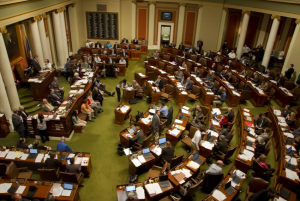 DFL state legislators are an awfully unpopular bunch. According to an August 2015 Public Policy Polling (PPP) survey of registered Minnesota voters, only 29% have a favorable view of DFL state legislators, while 49% disapprove. Not many candidates with 29% approval ratings get reelected.
DFL state legislators are an awfully unpopular bunch. According to an August 2015 Public Policy Polling (PPP) survey of registered Minnesota voters, only 29% have a favorable view of DFL state legislators, while 49% disapprove. Not many candidates with 29% approval ratings get reelected.
Still, DFL legislators may manage to do well in the November general election, due to at least five factors.
More DFLers voting. First, DFL turnout should be much higher in this presidential election year than it was in the 2014 midterm election. Historically, presidential year electorates tend to be more favorable to Democrats than mid-term year electorates. That historical trend is somewhat in question this year, with Democratic front-runner Hillary Clinton proving to be particularly uninspiring to her base in the primary season and Republican front-runner Donald Trump proving to be particularly inspiring to his base. But traditionally presidential elections have high Democratic turnouts, and Trump-fearing Democrats – particularly women, communities of color and new immigrants – have a particularly compelling reason to vote in 2016. That should give a big boost to Democratic state legislative candidates.
No catastrophes. Second, DFL legislators haven’t imploded. So far, there are no big DFL-centered scandals, like Phonegate or leadership sex scandals. There also is no particularly controversial issue, like a large tax increase on the masses. The construction of the Senate Office Building probably still has some demagogic appeal, but that doesn’t seem like a significant political albatross at this stage.
Happy days are here again. Third, it’s the economy, stupid. Fortunately for DFL legislators, Minnesota’s economy is quite strong. Seasonally adjusted unemployment is only 3.7%, while the national rate is 5.6%. Under Republican Governor Tim Pawlenty, Minnesota had a steady stream of budget shortfalls. Under DFL Governor Mark Dayton, Minnesota has enjoyed budget surpluses the last several years, while 19 states still have had budget deficits despite a relatively strong national economy. Republicans promised Minnesota voters that DFL proposals to increase taxes for the wealthiest and the minimum wage for the poorest would surely decimate Minnesota’s economy. That simply did not happen, robbing conservatives of their most compelling criticism of Democrats – that they can’t manage the economy.
Bully pulpit in DFL hands. Fourth, DFLers control the Governor’s bully pulpit. A relatively popular Governor Mark Dayton (47% approval) can use the bullhorn and large audiences that come with his position to make the case for DFL achievements and legislators. So can other popular prominent statewide elected DFLers, such as Senators Al Franken (48% approval) and Amy Klobuchar (55% approval). Governor Dayton is certainly no Tim Pawlenty out on the stump, but he is in a strong position to help drive a strong unified message about DFL legislators’ accomplishments.
Republicans are even less popular. Finally, and most importantly, DFL legislators’ 29% approval rating looks pretty awful, until you put it alongside GOP legislators’18% approval rating. Then it looks nearly stellar. To put that 18% approval rating in context, a disgraced President Richard Nixon had a 24% approval rating when he was forced to resign due to the Watergate scandal. With 63% of Minnesota voters disapproving of the job being done by Republican legislators, the slightly less disrespected DFL legislators would seem to have a shot at winning some elections this fall.
Note: This post was also featured in MinnPost’s Blog Cabin.

Those approval numbers, while pathetic in both sides of the aisle, are way better than US Congress approval ratings. Why do you think that is? Familiarity doesn’t breed contempt? The legislature is actually getting fhings done?
I think it’s generally easier to approve of leaders close to home than it is to approve of leaders far from home. A state legislator might be a friend, colleague, neighbor, or someone you have visited with at your doorstep or a meeting. That’s much less likely to be true of a Member of Congress.